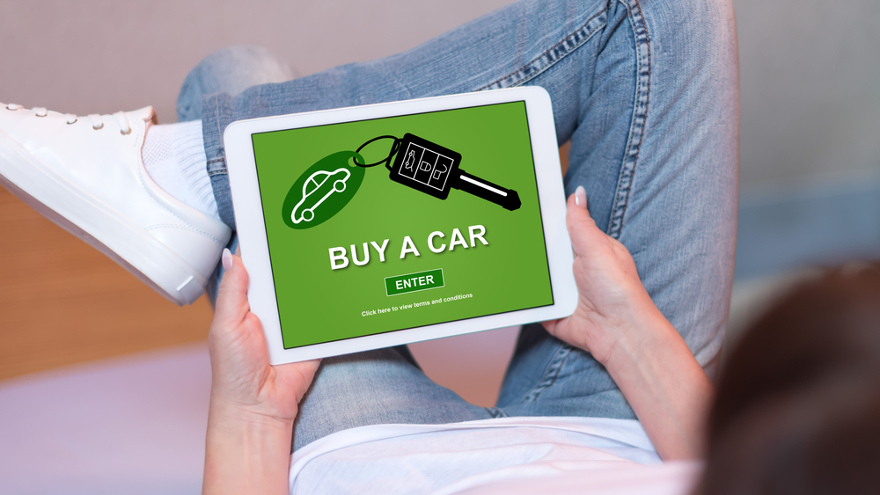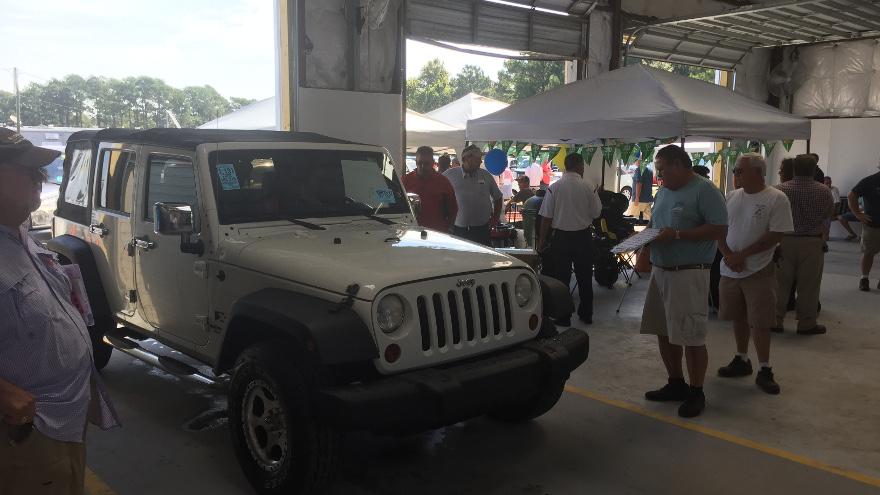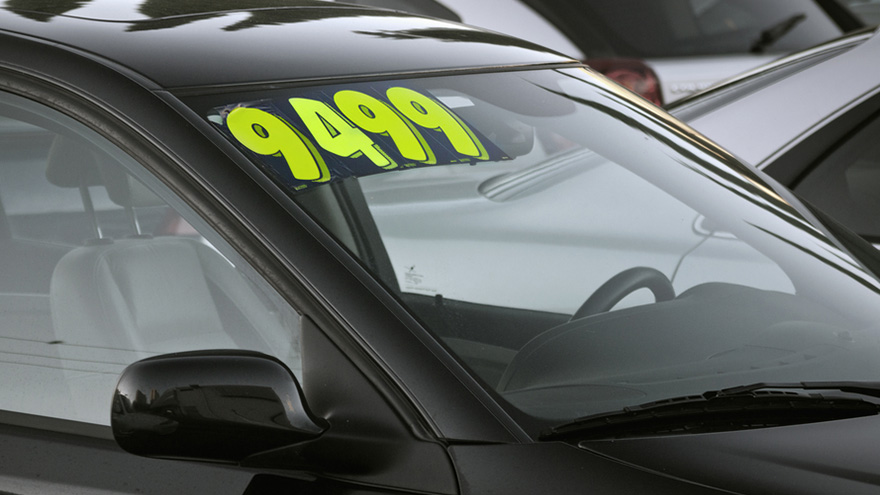Tech start-up Joydrive announced this week that a pair of franchised stores in New York joined its network of nearly 50 dealerships that are looking to connect with vehicle buyers who want to complete delivery at home.
The latest dealerships to connect with Joydrive include Sunrise Toyota of Oakdale, N.Y., and Sunrise Chevrolet in Forest Hills, N.Y. Between the two dealerships, another 1,000 vehicles now can be delivered through Joydrive, which says it provides an end-to-end solution that can allow vehicle buyers to price new and used cars from a variety of dealerships and purchase within Joydrive without ever visiting a dealership.
Jimmy Berg, dealer principal of both Sunrise Toyota and Sunrise Chevrolet, said, “Our dealerships take a lot of pride in that we are family owned and treat our customers like family. We have many customers that want to buy online and get their car delivered to their home, and we are excited to announce that we can now offer our great Sunrise customer service through Joydrive.”
One of the first dealerships to join Joydrive is glad to be on the platform.
“Whether Netflix or Amazon, consumers have come to expect an easy online purchasing experience, and we are excited to partner with other Joydrive dealers to offer consumers that experience. Our customers continually tell us how easy and welcoming the Joydrive purchase process is,” said Chris Brown, owner of Subaru of Puyallup, located south of Seattle.
When the start-up first rolled out its platform at the beginning of the year, the company explained that Joydrive works in three steps:
1. Buy online: The entire process can be completed online, from vehicle selection to delivery. After securing a vehicle with a $500 fully refundable deposit, a user-friendly dashboard shows all details of the transaction including trade-in, vehicle service contracts, financing options and delivery scheduling.
Of Joydrive’s first 250 transactions in beta mode, 40 percent included a trade-in, and 60 percent included financing.
2. Home delivery: Communicating through the dashboard, customers coordinate the vehicle delivery date and time with their licensed dealer representatives. Joydrive first delivered vehicles from California to Montana with an average distance of 135 miles.
Because vehicles are located on dealer lots, delivery can occur as fast as one day.
3. Five-day return period: Buying a vehicle can be the largest transaction customers make, so Joydrive and their dealer members offer a five-day return period or up to 250 miles to ensure customers love their purchase.
For more details, go to www.joydrive.com.
It’s got to be frustrating for dealers to see a competitor’s sticker on a vehicle that has a temporary license plate, likely signaling a recent delivery. And surely consumers aren’t pleased when they can’t purchase the vehicle they want at a cost they can afford.
In an effort to find solutions to reduce instances of both of those scenarios, Jumpstart Automotive Media on Tuesday announced a joint study with research firm, Ipsos, titled, “Today’s Auto Buyer and the Digital Retailing Experience.”
The report looks at points of view from both the consumer and the dealer to better understand the shopping journey, and how and where digital and mobile strategies have changed the consideration, negotiation and buying processes. While recognizing that the vehicle-buying process still carries an air of frustration and distrust, the goal of the research is to identify opportunities to make the buying process more satisfying all around.
Jumpstart commissioned Ipsos to conduct a comprehensive study into the consumer and dealer points of view. The study design included qualitative research consisting of a five-day online discussion with 28 U.S. consumers, a four-day online discussion with 28 dealers and nine 60-minute phone interviews with dealership GMs and owners. Following these results, quantitative research was conducted in the form of online surveys of 263 recent buyers, in-market or intending car shoppers, and 54 dealership employees.
How consumers select a dealership
The first disconnect the study revealed was in perceptions about how consumers select a dealership. Dealers’ perceptions were that their reputations and prior positive experiences are what bring consumers in the door.
However, study orchestrators found the most influential factors in consumers’ selection of a dealership are, by far, a low price and having the right inventory.
In fact, consumers were almost twice as likely as dealers to identify the “lowest price” as the more influential between those two factors. Consumers came in at 49 percent, while dealers registered at 24 percent.
Where shopping and research begins
The study indicated consumers spend an average of nine hours researching online before walking into a dealership, visiting an average of seven automotive sites, including manufacturer, dealer and third-party websites.
But dealer websites are far more influential than even dealers themselves perceive, according to the findings.
While dealers assume that consumers start their research on other sites, visiting the dealer website closer to the purchase, customers surveyed commonly stated that they use the dealer website very early in their shopping process.
Closing the gap on price differences
The study noted that perhaps the biggest difference between dealer perceptions and consumer realities is in negotiating the sale price.
While consumers prefer to do the majority of fact-finding online, the study pointed out that face-to-face communication becomes increasingly important to them at the end of the process. Three quarters (76 percent) of consumers think they will get a better price by negotiating in person as opposed to online.
That doesn't mean they like negotiating. Nor do dealers, according to the study.
Jumpstart and Ipsos determined this is one area where dealers and consumers misunderstand each other. Nine out of 10 consumers had at least some interest in a “no-haggle” model for vehicle buying, while dealers hate price haggling but feel customers expect it. Both sides would like to streamline the transaction process.
The report shed further light on the tension and differences of what's considered a “fair price.”
The study noted that 81 percent don’t believe a dealer’s “lowest price” and still expect to be able to negotiate savings of a few hundred to a few thousand dollars.
At the same time, the report acknowledged customers may not understand how vehicles are priced, which can lead to distrust and frustration.
“The art of a successful car deal is aligning customer desires, such as a fair price and a smooth, quick transaction, with dealer expectations that leverage their solid reputations,” said Libby Murad-Patel, vice president marketing and strategic insights for Jumpstart.
“This report goes into great detail in the motivations and beliefs of both sides, while offering actionable strategies for dealers to attract and better serve today’s auto buyers,” Murad-Patel added.
Michael Baer, senior vice president at Ipsos, added, “Like every other industry we study, digital content and communications have fundamentally altered the auto buying/selling process.
“Consequently, the dealership experience is completely changed from what it once was — consumers are visiting fewer of them, are doing their research in advance and are visiting them better prepared for negotiations,” Baer went on to say.
“There’s an emerging need for dealers/manufacturers to re-think and re-design the dealership experience and the role of dealers and salespeople to better fit consumers’ needs and expectations,” he said.
The entire report can be accessed via this website.
TradeRev is making a major expansion into the Southeast, arriving in five markets in Kentucky and Tennessee.
The business unit of KAR Auction Services announced on Tuesday that its dealer-to-dealer digital auction platform now can be used by dealerships and managers in the Kentucky cities of Louisville and Lexington as well as the Tennessee hubs of Nashville, Memphis and Knoxville.
Dealers in those areas now can use the TradeRev mobile app and desktop solution to facilitate and participate in live bidding, one-hour wholesale vehicle auctions. Enrolled dealers will also have access to the company’s H-powered AI technology and an active network of thousands of buying and selling dealerships.
“TradeRev and KAR continue to make meaningful investments to accelerate the digital revolution and meet increasing customer demand for our digital auction solution,” said Becca Polak, president of TradeRev.
“We’re excited to help dealers in Kentucky and Tennessee expand their marketplace and sell and source inventory anytime, anywhere from coast-to-coast. And together with our sister companies at KAR, we’re also able to deliver seamlessly integrated floorplan financing and logistics solutions that simplify and streamline the auction experience,” continued Polak, one of a host of industry executives on tap to appear during Used Car Week 2018, which begins Nov. 12 in Scottsdale, Ariz.
As part of this market expansion, TradeRev mentioned that it is adding in-market sales leadership and field personnel to keep up with high enrollment demand, provide personalized dealer training and assist dealers with loading and launching cars. The markets will also be supported by TradeRev’s English, Spanish and French speaking customer service teams and a data-driven inside sales department that will ensure local dealers are rapidly integrated into TradeRev’s broad North American marketplace.
“When we launch TradeRev into a market — we make a long-term commitment to our dealer partners,” said Keith Crerar, executive vice president of U.S. sales and global operations for TradeRev.
“We don’t just airdrop a single salesperson. We deeply embed experienced, multi-functional teams that understand the auction business and the unique local needs of our dealers. Then we arm them with the industry’s best technology, data and intelligence to help our dealers move metal faster, easier and smarter than ever before,” Crerar went on to say.
Interested dealers can visit www.TradeRev.com to enroll.
North Carolina officials said that as of 6:30 p.m. ET on Sunday, 455 road closures remained throughout the Tar Heel State because of flooding created by Hurricane Florence making landfall more than a week ago.
But in one of the hardest hit areas — Wilmington, N.C. — vehicles will be crossing the block again. Cox Automotive sent a note to Auto Remarketing on Monday morning confirming that Manheim Wilmington has reopened. The facility plans to host its next sale on Friday.
While consignment will resume within miles of the Atlantic Ocean, the National Automobile Dealers Association shared how the impact on members in the Carolinas has been significant. The association reiterated that dealership employees affected by any natural disaster including Florence can apply here for financial assistance from the NADA Foundation.
Sims Floyd, executive vice president of the South Carolina Automobile Dealers Association told NADA: “A lot of people are out of their homes. A lot of dealership employees are in and out trying to take care of their homes, so we’re dealing with that.
“And it looks like we’re going to deal with that for a while more,” Floyd added in a blog post compiled by NADA.
Perhaps a bright spot for auctions and dealers beyond the Carolinas, North Carolina Gov. Roy Cooper announced on Sunday night that Interstate 95 throughout North Carolina is now open to all traffic.
Cooper said floodwaters that covered the interstate following Florence receded quicker than expected, allowing the North Carolina Department of Transportation to complete the inspections and repairs needed to reopen the road.
“I-95 is a major artery for North Carolina and the entire East Coast that’s essential for commerce,” Cooper said. “Our state DOT crews and engineers have worked around the clock to get this critical interstate open ahead of schedule and reduce traffic in areas still needed for critical life-saving missions.”
Cox Automotive is holding steady with its estimates of vehicle damage from Hurricane Florence as flooding reaches near record levels in some places in North Carolina.
The analyst team led by Cox Automotive chief economist Jonathan Smoke initially estimated last week that 20,000 to 40,000 vehicles could be lost due to flooding in the Carolinas. The latest update showed that estimate has not changed as the area tries to recover from this hurricane that the National Weather Service said dumped an estimated 8 trillion gallons of water.
All of that water is eventually working its way back to the Atlantic Ocean through waterways such as the Cape Fear River, which officials expect to crest this week in Fayetteville, N.C., at 61.6 feet, about 7 feet below the all-time high set in 1945.
Of course, during the process, vehicles in the path of flooding could be damaged if they haven’t been already. The scenes have triggered reminders of what happened last year after Hurricane Harvey deluged Houston with the most rainfall ever recorded during a single storm in U.S. history.
“We’ve been asked many times how this event differs from the devastating floods in Houston last year. From a business point of view, one difference is the current volume of used-car inventory,” Smoke said in Cox Automotive’s latest commentary.
“We’ve seen wholesale supplies tighten this year, and retail inventory has been moving more rapidly as a result. These are clear signs that demand continues to outpace supply,” he continued. “Going into last weekend, we had started to see more stabilization after values rose for the last three months, reaching an all-time record in August.
“Even though the replacement need will be smaller in this case, we could see values increase temporarily especially in the region due to limited supply,” Smoke went on to say.
“Hurricane Florence and its aftermath, however, will not have the notable impact on the larger U.S. vehicle market that we saw with Harvey, where an estimated 600,000 vehicles were damaged or destroyed, impacting both supply and demand,” he added.
The National Automobile Dealers Association reiterated that its philanthropic division is ready to provide help to member store employees impacted by Florence. Applications for assistance and a path to make donations can be found here.
“There are so many heroes to thank. The rescuers who are risking their lives to pull people from flood waters. The law enforcement and firefighters who are working around the clock. The nurses and doctors, the pilots, the utility workers. From the people of North Carolina, I say thank you,” North Carolina Gov. Roy Cooper said in a news release.
Another startup launched this summer now has a tool designed to give both potential buyers and dealers insight about how retail prices are behaving up and down car rows and beyond in California.
On Tuesday, newcomer CarlStreet announced the general beta availability of its CarlStreet Real-time Market Value (RMV) service. The company said the solution can give consumers and dealers what it contends are up to the minute market values for used vehicles by leveraging advanced machine learning and big data techniques.
CarlStreet emphasized its solution can more accurately model real local market conditions than other approaches.
Previously in stealth mode but now in beta, consumers can research cars on the CarlStreet platform from thousands of dealers throughout California to help them make a more informed decision before their next car purchase.
“Our deep real-time analysis of both regional and hyper-local pricing and sales data gives unique insights to consumers looking to buy their next car or sell the one they have,” said Lyle Dizon, chief operating officer at CarlStreet. “Never before have consumers had access to such an accurate representation of the value of a vehicle.”
In addition to discovering great deals on used vehicles, consumers can also sell their cars using an easy, secure process where CarlStreet can help find a buyer and handle all the back-end paperwork and financing details.
When selling to a private party — even if they owe money on their vehicle or have a lease return — CarlStreet can assist with the financing process to get their buyer a great rate and deal with the payoff.
“This opens up a range of possible buyers previously not available through traditional private party sales channels,” the company said.
For consumers who would prefer not to sell their car privately, CarlStreet offers the ability to get competitive cash offers from dealers to purchase their vehicle directly. The company insisted dealers benefit from having access to this inventory from consumers before they trade it in at another dealership who is likely to send it to a physical auction.
“We started CarlStreet with the goal of modernizing the automotive ecosystem and give consumers more options in a way that’s also friendly to dealerships,” CarlStreet chief executive officer AJ McGowan.
“Dealers often get a bad rap but with the launch of CarlStreet RMV we’re taking an important step in increasing price transparency between buyers and sellers. More transparency equals more trust between all parties,” McGowan went on to say.
More details can be found at CarlStreet.com.
As flooding continues, the used-car industry is mobilizing efforts to handle ramifications from Hurricane Florence, which authorities say already has resulted in 19 deaths throughout the Carolinas.
From how to handle another swell of flood-damaged vehicles to what replacement demand might do to wholesale prices, Auto Remarketing reached out to an array of industry leaders and experts on Monday. DriveTime chief executive officer Don Reese might have summarized the entire situation when he said in a news release before Florence inundated parts of the Carolinas with nearly 30 inches of rain: “The safety of our employees and customers is our primary focus.”
Reese and managing director of retail Jamie Fischer spoke in a YouTube video on behalf of DriveTime and its affiliated finance company, Bridgecrest, with more than $6 billion in serviced auto contracts, sharing their Florence emergency response that includes assistance for impacted employees, customers and the communities where all reside.
Meanwhile, Insurance Auto Auctions chief executive officer and president John Kett described a similar sentiment via a letter sent to Auto Remarketing that mentioned in part, “We all have great concern for those in the storm’s … path.”
Kett also mentioned that in less than one week, IAA organized more than 1,300 trucks to transport vehicles, more than 400 dedicated IAA team members to assist with the effort and nearly 1,100 acres to store damaged units.
“The stats above truly illustrate the power of IAA’s operational grit, strength and the overall breadth of our organization’s capability. I am confident we are prepared to serve our customers in this time of need,” Kett wrote in a letter dated from last Thursday.
Auto Remarketing followed up with IAA and asked what unique challenges come from responding to a natural disaster in the Carolinas.
“In terms of Florence, we are facing two challenges as we respond, flood waters and lack of power,” Kett said in an message sent via email late on Monday afternoon. “Flood waters have completely cut off some areas, such as Wilmington, and our IAA Tow Network simply cannot safely access them today. Flood waters have also made some roads/highways inaccessible or have completely closed them down such as I-95 just north of Fayetteville, N.C.
If roads are closed, it is difficult for tow trucks to easily drive into certain areas which can increase the time it takes to pick up a vehicle,” he continued. “Simple lack of power creates all the usual issues, however communicating can also be difficult if cell phones cannot be easily charged.”
Kett also described the most important lessons learned from Hurricane Harvey a year ago that could help sharpen IAA’s management of Florence-related demands.
“The IAA Catastrophe Response team maintains a philosophy of continuous improvement,” Kett said. “One of the most critical lessons we learned from Harvey was specific to our tower assignment and dispatch process. IAA assigns specific vehicles to a tower based on their equipment and dispatches them to pick up and drop off vehicles at one of our facilities. The process, for IAA, had been historically manual and paper based. During Harvey, IAA had over 1,000 towers in operation and saw the potential for this manual process to create long wait times for towers.
“In the year since Harvey, we have worked diligently to fully automate our assignment and dispatch process, and today our towers utilize the IAA Tow App,” he continued. “This allows them to receive assignments and be dispatched to vehicles all via their web enabled phone or device. They no longer need to come into a branch to receive paper assignments.
“The Tow App also provides both IAA and our seller clients with real time data so we know when a vehicle has been secured as well as when and where it has been dropped off,” Kett went on to say. “There are several additional benefits to the new IAA Tow App including decreased cycle time for vehicle pick-up, improved data for insurance companies, and minimal downtime for towers.”
Meanwhile, Cox Automotive also shared an update on the status of its operations within Florence’s path. As of Monday afternoon:
• Manheim Wilmington is closed until further notice.
• Manheim Statesville: conducting regular business hours
• Manheim Charlotte: conducting regular business hours
• Manheim Darlington: conducting regular business hours
• Manheim North Carolina: conducting a digital versus in-lane sale on Monday
“In the wake of Hurricane Florence, Manheim is focused on ensuring the safety and well-being of our team members in affected areas,” said Tim Janego, Manheim regional vice president for the Northeast Region. Thankfully, we’ve accounted for all North and South Carolina team members.
“The Atlanta-based corporate human resources team is providing relief resources and information to those impacted by the storm, record-breaking flooding and loss of utilities,” Janego continued. “We’re also connecting Manheim team members to the Cox Employee Relief Fund (available through Manheim’s parent company Cox Enterprises), which offers immediate financial assistance for unexpected needs resulting from a disaster.
“In addition, Cox Automotive is committed to helping the American Red Cross with disaster relief efforts and invites team members and their family and friends, as well as clients to donate to American Red Cross relief efforts at https://www.redcross.org/coxauto-emp.
“While taking care of our people, we’re also assessing our clients’ inventory and communicating with dealers about the status of their assets and our business operations,” Janego went on to say while adding that clients can go to Manheim.com for more information.
An update from Auction Management Solutions indicated neither of its auctions near Florence’s path sustained damage, but each was impacted by dealer attendance for its weekly sales.
“The dealers (buying and selling) in the affected areas did not attend the sales so overall attendance was light, even online,” AMS said in a message sent to Auto Remarketing.
AMS added that Richmond Auto Auction (RAA) moved its anniversary sale to Friday, allowing dealers in the impacted areas to attend and source inventory.
RAA will be including a fundraiser for all those dealers and their employees impacted by Florence. Individuals can contact Wyatt Carter at [email protected] for more information.
The National Automobile Dealers Association reiterated its commitment to help employees of dealership members who might be impacted by Florence.
The NADA Foundation’s Emergency Relief Fund provides financial assistance to dealership employees and their families who sustain personal property damage from the hurricane and potential floods.
To download the application for financial assistance, visit www.nada.org/emergencyrelief. For more information, call (703) 821-7102.
According to the latest news release from North Carolina Gov. Roy Cooper, first responders have reported rescuing and evacuating 2,600 people and 300 animals from flooded areas so far, and rescues are ongoing in the Tar Heel State. Nearly 1,000 personnel from North Carolina and other states, the Federal Emergency Management Administration (FEMA), the National Guard and the Coast Guard deployed with more than 200 boats and several helicopters to conduct search and rescue operations, mostly in the southeast portion of the state.
Officials anticipate rescue operations to continue for several days.
Undoubtedly vehicles are being left behind as flooding continues. Cox Automotive distributed some early estimates of potential damage before Florence pushed ashore.
In a message to Auto Remarketing, Black Book reiterated that approximately 700,000 cars and trucks were either damaged or destroyed during Hurricanes Harvey and Irma last year in the Texas and Florida regions. Editors pointed out this toll eventually led to an increase in the price of some used vehicles, as demand rose from people immediately looking to replace their damaged or destroyed vehicles.
Black Book noted that demand for cars, especially this summer already was causing prices to rise slightly even before Florence, so any rush to replace damaged vehicles could force prices higher in the near term. Last month alone, editors computed the average price of a used compact car was listed at $8,784, about 0.6 percent higher than the previous month.
Prices for midsized cars were listed at $10,341, about 0.8 percent higher than the previous month.
“Typically at this time of year, prices on those cars are seeing declines, not increases,” Black Book said.
For now, getting people to higher ground is taking priority.
“Flood waters are raging across our state, and the risk to life is rising with the angry waters,” Cooper said. “We are working now in doing everything we can to prevent more deaths.”
Editor's note: Auto Remarketing will update this report as developments arise.
Dealership inventory managers who are interested in honing their car-buying, car-pricing and car-merchandising skills can look forward to two days of training hosted by Lotpop and co-sponsor Strong Automotive Merchandising next month.
Lotpop announced Monday that it will host its first Dealer Workshop on Oct. 16 and Oct. 17 at the Kansas City Auto Museum in Olathe, Kan.
During the two days of training, the provider of inventory management consulting said that the event will offer attendees in-depth training pertaining to dealership inventory processes, internet processes and marketing.
A team of instructors chosen by Lotpop founder Jasen Rice will lead a total of three educational sessions over the two days of training, according to Lotpop.
Rice, a former dealership internet manager and performance manager at vAuto, is also currently a producer and instructor for Lotpop's Lotparty video podcasts.
While admission for the upcoming Dealer Workshop is free for both current and previous Lotpop or Strong Automotive clients, non-clients can attend the training event for a fee of $495.
Along with lunch on both days, Lotpop said that it will provide dinner on the first night and breakfast on day-two. For more information about the Dealer Workshop or to register for the event, click here.
AAA looked to explain that vehicle calculation dealerships and finance companies know well, but the average consumer might not understand — depreciation.
While dealerships have their run lists from auctions, and finance companies have scorecards, a study released on Thursday from AAA pinpointed depreciation as the largest expense associated with purchasing a new vehicle, computing that cost at more than $3,000 per year.
And like dealerships and finance companies understand, too, AAA’s 2018 Your Driving Costs study acknowledged that depreciation can be influenced by a number of factors, including shifting consumer preferences.
“New vehicles offer the latest designs, cutting-edge technologies and warranties that offer peace-of-mind,” said John Nielsen, AAA’s managing director of automotive engineering and repair. “But, car owners that like to change vehicles frequently should be thinking about the resale value — not just the purchase price — when choosing their next ride.”
AAA’s analysis found the average cost to own and operate a new vehicle in 2018 is $8,849 per year. The figure is calculated based on the cost of fuel, maintenance, repairs, insurance, license/registration/taxes, depreciation and interest on financing. The study examined 45 top-selling 2018 model-year vehicles across nine categories.
AAA’s annual analysis found demand for sedans has slipped as American appetite shifts to SUVs and pickup trucks. As a result, depreciation costs of these once-popular vehicles increased up to 13 percent as compared to last year.
Electric and hybrid vehicles, however, have seen a gain in popularity with 20 percent of Americans saying they will likely go electric for their next vehicle purchase, up from 15 percent the previous year.
This year, these vehicles also saw a dip in depreciation and offer many cost benefits such as lower repair and maintenance bills, making going green a more affordable choice than in years past.
AAA closed with one final point — again one that dealerships and finance companies understand quite well if consumers want to avoid a big depreciation hit
“The secret to minimizing depreciation costs?” continued Nielsen. “Keep your car for a long time and keep it well-maintained or even consider buying a quality, pre-owned vehicle.”
Cost to own and operate a new vehicle in 2018
|
Vehicle Type
|
Annual Cost*
|
|
Vehicle Type
|
Annual Cost*
|
|
Small Sedan
|
$6,777
|
|
Minivan
|
$9,677
|
|
Hybrid
|
$7,485
|
|
Medium SUV
|
$9,697
|
|
Small SUV
|
$7,869
|
|
Large Sedan
|
$9,804
|
|
Electric Vehicle
|
$8,384
|
|
Pickup Truck
|
$10,215
|
|
Medium Sedan
|
$8,866
|
|
Average
|
$8,849
|
*Based on 15,000 miles driven annually. Source: AAA
Dealers are looking for bargains in the auction lanes just like potential buyers are when they scour store websites or walk rows of inventory.
As a result, this week’s Market Insights report from Black Book detailed the continued strength currently on display in the wholesale market, with a handful of cars showing increases in early September, as well as trucks.
“The used-vehicle market remains hot as retail buyers show strong demand for affordable personal transportation, and dealers are eager to procure inventory to meet the retail demand,” said Anil Goyal, executive vice president of operations at Black Book.
Volume-weighted, editors indicated overall car segment values increased by just 0.09 percent last week. In comparison, the values had decreased at a rate of 0.08 percent per week during the previous four weeks.
Among car segments, Black Book noticed sporty car and compact car values increased the most last week, rising by 0.34 percent or $52 and 0.33 percent or $26, respectively.
Again volume-weighted, editors determined overall truck segment values (including pickups, SUVs and vans) dipped by only 0.04 percent last week. That’s less than what editors recorded during the previous four weeks when truck values softened by a rate of 0.13 percent per week.
Full-size van and full-size crossover/SUV values increased the most last week among truck segments. Those vans rose by 0.24 percent or $33, while the utilities climbed by 0.20 percent or $44.
As far as what Black Book representatives are observing in the lanes when they attend about 60 sales per week, the ongoing wholesale price strength continues to be top of mind for dealers even when metal is turning back at their stores. Here is the rundown going from East to West:
— In Massachusetts: “Dealers are clamoring for trucks but are also purchasing passenger cars to fill in the holes on their retail lots.”
— In Pennsylvania: “Another really good auction this week. The market here is really amazing for a late third-quarter market.”
— In Indiana: “Consignment is still running low here. August was a good month to be a used-vehicle dealer as retail remains strong.”
— In Michigan: “There has been a small increase in the auction inventory recently. Prices continue to be up in both the car and truck segments.”
— In California: “Dealers are expressing frustration about the prices they are having to pay for inventory.”












